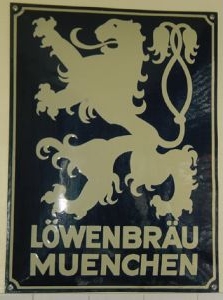Feb
22
Löwenbräu
February 22, 2007 | Escribe un comentario
Löwenbräu cerveza beer
Löwenbräu has a long history dating back to 1383 when it was first brewed at “Zum Löwen” (The Lion’s Inn) by an innkeeper. Löwenbräu has been served at every Oktoberfest in Munich since 1810 and is one of only six breweries permitted to serve beer at the festival. During Oktoberfest, Löwenbräu brews a special beer called “Wiesenbier” (literally “meadow beer”, refers to the Bavarian name of the Oktoberfest, the “Wiesn”), a fresh, light amber lager.
The Löwenbräu brewery was bombed to rubble during an Allied air raid in 1945. It was later rebuilt.
Up until 2002, Löwenbräu beer sold in American markets was brewed under license by Miller Brewing Company, and was given an anglified pronunciation. Although it claimed to use the same “recipe”, this American brewed version included corn in the grain bill, so the taste was clearly and markedly different than the Munich brewed version (most notably lacking was the malty flavor characteristic of many German lagers). After 2002, Löwenbräu began directly exporting its beer from Munich. To distinguish itself from the Miller version of Löwenbräu, the German version is marketed as Löwenbräu Original. Some people in America still use the anglified pronunciation for Löwenbräu Original, while others mark the distinction by using the anglified pronunciation to refer to the Miller product, while using the German pronunciation to refer to the German product. In the years before the Miller licensing arrangement, Löwenbräu Oktoberfest beer bottled for export for sale in the U.S. was in the “Märzen” style, an amber/copper hued beer in the 6.2+ ABV range. With the return of authentic German Löwenbräu to the U.S., as currently offered this product is lighter color (in the “Helles” style), although still of higher alcohol content than Löwenbräu Original.
In October 2004, the parent company of Löwenbräu was acquired by Inbev.[1]
Löwenbräu Keller has also one of the many Biergärten in Munich.
Beers
- Löwenbräu Original – 5.2% ABV, a Munich helles
- Pilsener – 5.4% ABV, the hoppiest of Munich’s pilseners
- Dunkel – 5.5% ABV, a dark lager
- Triumphator – 7.6% ABV, a doppelbock
- Löwen Weisse – 5.2% ABV, a hefeweizen
- Urtyp – 5.4% ABV, a helles brewed according to traditional methods
- Löwenbräu Oktoberfestbier – 6.1% ABV, a Märzen brewed for Oktoberfest
Advertising
In the 1970s and 1980s in the United States, Löwenbräu (brewed in the U.S.) was famous for its jingle, sung by Arthur Prysock:
- Here’s to good friends,
- Tonight is kind of special.
- The beer we’ll pour
- must say something more, somehow.
- So tonight (tonight),
- Tonight,
- Let it be Löwenbräu (let it be Löwenbräu).
- It’s been so long.
- Hey, I’m glad to see ya.
- Raise your glass.
- Here’s to health and happiness.
- So tonight (tonight),
- Let it be all the best.
When Löwenbräu returned to the U.S. with the beer brewed in Germany, it briefly ran an ad with the same song in German.
Este grupo de anuncios es especialmente directo. El hecho de que la publicidad de bebidas deba apelar a cualidades metafóricas además de las habituales hace que su confcción deba ser particularmente visual. Recomendamois muye specialmente lso anuncios de cerveza alemana, muy del estilo de los emblemas deportivos o políticos, en busca de una rápida y firme identifiación del consumidor con la marca al objeto de fidelizarlo.
La mayoría de los anuncios de esta categoría apelan al orgullo y al bienestar, intentando generar sensación de pertenencia a un grupo.
